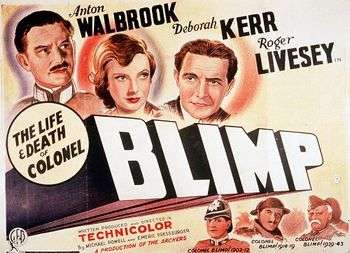The Life and Death of Colonel Blimp

"You laugh at my big belly but you don't know how I got it!
You laugh at my mustache but you don't know why I grew it!"—Major General Clive Wynne-Candy
A film whose protagonist is alive when the credits roll, is not a colonel, and is not surnamed "Blimp". Despite this triple deception, it is very good.
Opening in 1943 in the midst of World War Two, a group of enterprising British soldiers decide to launch planned war games early, contemptuous of the Home Guard's order that "the war starts at midnight" (they reason that the Germans wouldn't work like that). They capture the Home Guard's commander, Major General Clive Wynne-Candy (Roger Livesy), while he's in the Turkish bath, and mock his protests and his fat belly. An enraged Candy segues into the story of his life. Flashing back 41 years to 1902, we see a young Clive Candy, newly returned from the Boer War and wearing his new Victoria Cross. A visit to Germany to refute anti-British propaganda leads to a meeting with Miss Edith Hunter (Deborah Kerr) and a duel with Prussian officer Theodore Kretschmar-Schuldorff (Anton Walbrook). Over the next forty years, Clive and Theodore will meet several more times, including in World War I, and Clive will always be on the lookout for other women like his idol, Edith.
The film was released in 1943 in the United Kingdom, at the height of World War Two, and two years later in the United States (in heavily edited form). It has subsequently been considered one of the finest British films, and the first collaboration between writer-directors Michael Powell and Emeric Pressburger in their solo production company, The Archers. The duo would go on to make several more films, including The Red Shoes and Black Narcissus. Also notable for being the breakout part for British actress Deborah Kerr, who was only 21 when the film was made.
- Acting For Three: Deborah Kerr plays three roles: Edith Hunter in 1902, Barbara Wynne in 1918-1919, and Angela Cannon in 1939-1943.
- Adaptation Decay: The original Colonel Blimp of the editorial cartoons was a caricature of a reactionary old army officer, but here's been renamed and made deeply sympathetic. Good example of Tropes Are Not Bad.
- All Germans Are Nazis: Averted! One of the main reasons Churchill disliked the film was the character of Theo, a sympathetic German (though explicitly anti-Nazi). He remained in the story thanks to Powell and Pressburger's artistic commitment.
- Bittersweet Ending
- Defeat Means Friendship: Sort of. Clive and Theo become lifelong friends after their duel, but the film never tells us who won (or whether either of them did). Later, Clive takes this attitude toward Germany after the 1918 Armistice.
- Good Is Old-Fashioned: Candy thinks of war as a gentleman's game with rules, but he lives into the age of Total War, where this is outmoded.
- Honor Before Reason: Candy would rather lose the war than win by stooping to "dirty" methods. Theo points out that if the British did that, the only methods left in the world would be Nazi methods. The fact that the government doesn't share Candy's view leads to his being retired from service again.
- In Name Only: The title is based on the satirical comic strip Colonel Blimp, but the film has an original story.
- Long Speech Tea Time
- Sliding Scale of Idealism Versus Cynicism: Candy is idealistic, Theo and most other people are cynical.
- Spiteful Spit
- Token Enemy Minority: Theo.